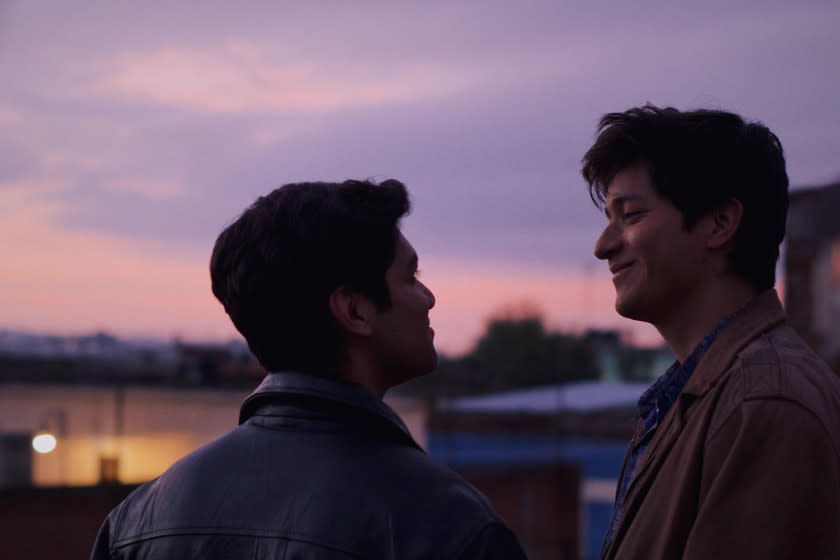
The Times is committed to reviewing theatrical film releases during the COVID-19 pandemic. Because moviegoing carries risks during this time, we remind readers to follow health and safety guidelines as outlined by the Centers for Disease Control and Prevention and local health officials.
“They hate us over there.” That’s Gerardo (Christian Vázquez), alarmed to hear that his boyfriend, Iván (Armando Espitia), is thinking of leaving home and crossing over into the United States. For a moment, under the circumstances, you’d be forgiven for not knowing exactly what he means by “us.” Is he referring to Mexicans seeking a better life in a country that’s sure to regard them with fear and loathing? Or could he mean gay people, likely to encounter ignorance and hostility even in an ostensibly more tolerant society than the one they’re living in?
The answer, at least in this instance, is the former. But one of the sad ironies of “I Carry You With Me,” Heidi Ewing’s emotionally direct, formally complicated new movie, is that in attempting the dangerous journey across the border, Iván and Gerardo would effectively be exchanging one form of persecution for another. We’ve already seen them lock eyes for the first time across a gay bar in 1994 Puebla, Mexico, a refuge from a world that forces them to suppress their true desires. Moving to the U.S. would require them to don another kind of mask and live under constant threat of exposure, arrest and deportation.
A time-shifting, form-blurring romance that spans two countries and as many decades, “I Carry You With Me” means to peer behind those masks, to lay bare the unvarnished inner truth of Iván and Gerardo’s life together and apart. You can feel the weight of that purpose in every frame, even when cinematographer Juan Pablo Ramírez gently shakes and rattles the camera in studied pursuit of a raw, kinetic spontaneity. Iván and Gerardo aren’t just fictional constructs but real-life individuals, and Ewing, a close friend of theirs, shows an almost palpable commitment to capturing their love story in all its intimate and epic proportions.
Its topical ones too. Best known for the documentaries she’s directed with Rachel Grady (including “Detropia,” “12th & Delaware” and the Oscar-nominated “Jesus Camp”), Ewing embraces the conventions of dramatic narrative without entirely abandoning the trappings of nonfiction. The issues at stake here — the perils of migration, the persecution of undocumented immigrants and sexual minorities — are hardly unique to Iván and Gerardo, but as Ewing reasonably intuits, they might well be the ones best equipped to address them here. And so the two men appear as themselves, mostly in the present-day New York scenes that occupy the movie’s final third.
In the first two acts, largely set in mid-’90s Mexico, we follow their younger counterparts — beautifully played by Espitia and Vázquez — as they enact a tender, touching forbidden romance. Their bond, forged under the warmly caressing light of that gay bar and often accompanied by Jay Wadley’s lovely score, is later consummated in secret on the grounds of Gerardo’s family home, barely out of earshot of his gruffly authoritorian father (Pascacio López). Gerardo, a schoolteacher, has a charming defiant streak; though he keeps his sexuality hidden from his family, he’s otherwise raffishly at ease with it in ways that his new boyfriend is not. Iván is shyer and more cautious by nature, and he has a young son he fears he would never see again if the boy’s mother (Michelle González) found out the truth.
These differences in class, temperament, family and worldview are sketched in with a light, glancing touch that seems reluctant to settle or linger, sometimes at the expense of a more concrete sense of place and character. Ewing, who wrote the script with Alan Page Arriaga, captures fragments on the fly, moving from the exuberant spectacle of a drag performance by Gerardo’s best friend, Cucusa (a delightful Luis Alberti) to a restaurant where Iván, a janitor and aspiring chef, struggles to get a kitchen job. She throws in flashbacks to Ivan’s and Gerardo’s very different childhood experiences of ingrained homophobia, moments that are almost evocative enough in their details — a bright yellow quinceañera dress, a dark night on a family farm — to make you overlook the tidiness of the contrast.
Eventually Iván sets off for the U.S. in search of better opportunities, money for his kid’s future and a life that he hopes he might one day share with Gerardo. As he begins the harrowing trek north with his friend Sandra (comedian Michelle Rodríguez, very good), “I Carry You With Me” shifts registers from wistful romantic melodrama to tense border-crossing thriller, then leaps ahead to find Iván, Sandra and others sharing a cramped apartment. Notably, our early glimpses of the U.S. are mostly confined to such nondescript interiors, as if to suggest that while Iván’s surroundings have changed, his sense of entrapment has not.
Eventually the scope of the frame widens, as Iván gradually finds his way and pursues his culinary dreams, and the shimmering lights and vibrant streets of New York begin to feel like home. Twenty years pass in a flash, and Ewing, working with editor Enat Sidi, begins interweaving the real-life, present-day Iván and Gerardo with their fictional younger counterparts. It’s a daring gambit if not an entirely successful one, partly because of the wobbly physical resemblance between the two sets of leads but mainly because two decades — full of their own struggles and hard-won triumphs, including Gerardo’s decision to join Iván in the States — seem to have fallen by the narrative wayside.
There’s something admittedly poignant about that abrupt leap forward; one piercing scene shows Iván watching a video of his now-grown son, whom he hasn’t seen in years. But a fuller sense of time’s passage — of what the older Iván means when he says, “The American dream happens in slow motion” — is precisely what’s missing. Still, if past and present, fiction and nonfiction never fully cohere, that formal disjunction nonetheless achieves its own strange power. It literalizes the chasm — cultural, geographic, emotional — between the lives Iván and Gerardo are leading in the present and the lives they sacrificed to make that present possible.
Increasingly dreamlike in its swirl of associations and images, “I Carry You With Me” becomes a bittersweet ode to restlessness, a fractured evocation of lives and identities that have been uprooted and torn apart many times over. Its imperfections and its beauties are inextricable from each other, and also from the sad, inspiring real-life story it has to tell.
This story originally appeared in Los Angeles Times.








